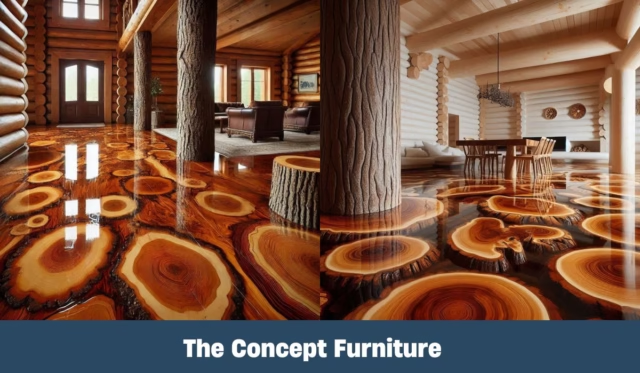Discover the charm and functionality of log floors. Learn how to design, install, and maintain log flooring for a warm and rustic aesthetic in your home.
Log floors are more than just a flooring option—they are a design statement. With their natural appeal, durability, and rustic charm, they add warmth and character to any space. Whether you’re building a log cabin, renovating your home, or simply exploring rustic design ideas, log floors offer endless possibilities. This comprehensive guide dives into everything you need to know about log flooring, from design considerations to maintenance tips.
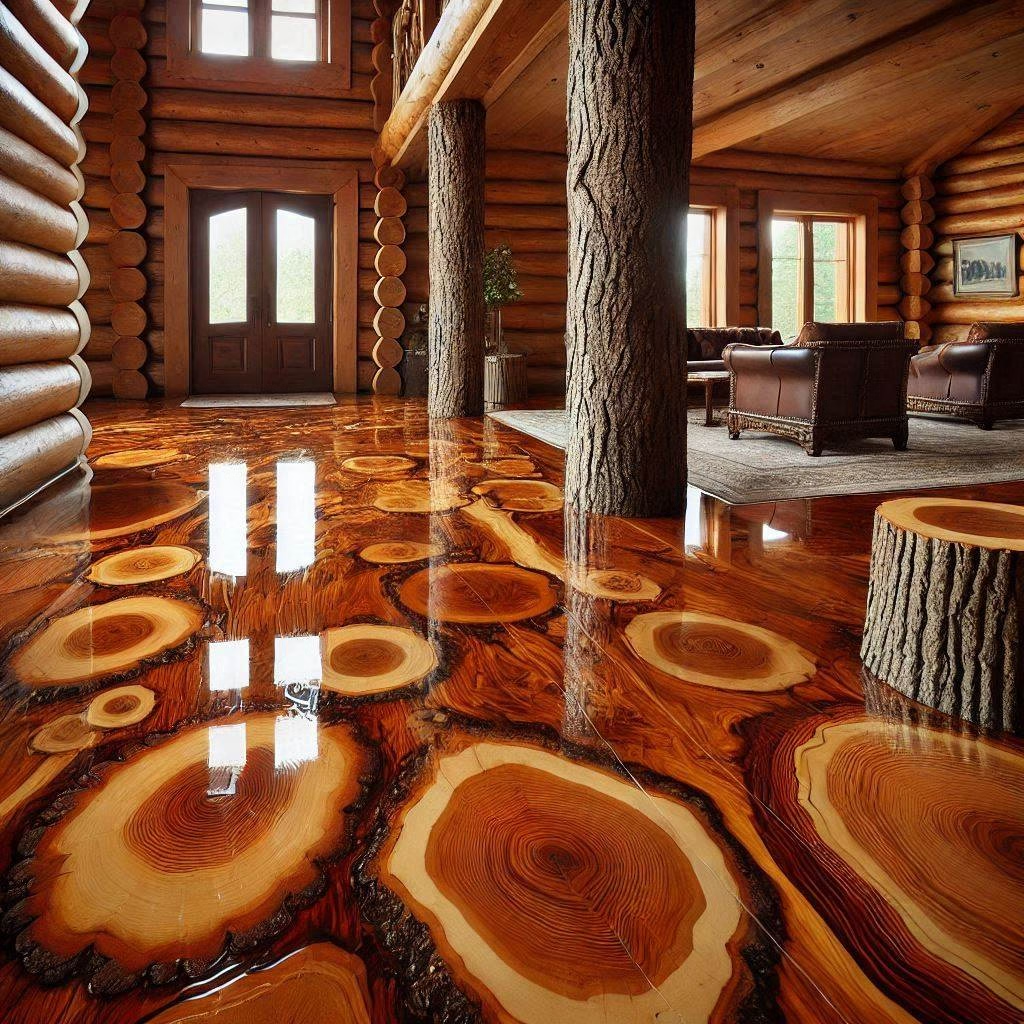
What is a Log Floor?
Log floors are wood flooring solutions crafted from solid logs or engineered wood, designed to mimic the natural beauty of timber. Unlike standard hardwood flooring, log floors often feature unique textures, grains, and finishes that showcase the raw charm of wood.
Why Choose Log Floors?
- Aesthetic Appeal: Log floors create a cozy, rustic vibe perfect for cabins, country homes, and modern spaces alike.
- Durability: High-quality log flooring can last decades with proper care.
- Eco-Friendly: Sustainable wood sourcing ensures that log flooring is an environmentally friendly choice.
Types of Log Flooring
Solid Wood Log Floors
Solid wood log floors are crafted from single pieces of timber. They offer unmatched authenticity and durability but may require acclimatization to the home’s humidity levels before installation.
Advantages:
- Natural look and feel
- Longevity
Disadvantages:
- Higher cost
- Susceptible to moisture changes
Engineered Wood Log Floors
Engineered wood log floors consist of a real wood veneer on top of a multi-layered core. They are designed to handle temperature and humidity fluctuations better than solid wood.
Advantages:
- Budget-friendly
- Easy installation
Disadvantages:
- Shorter lifespan compared to solid wood
- Limited refinishing options
Design Ideas for Log Floors
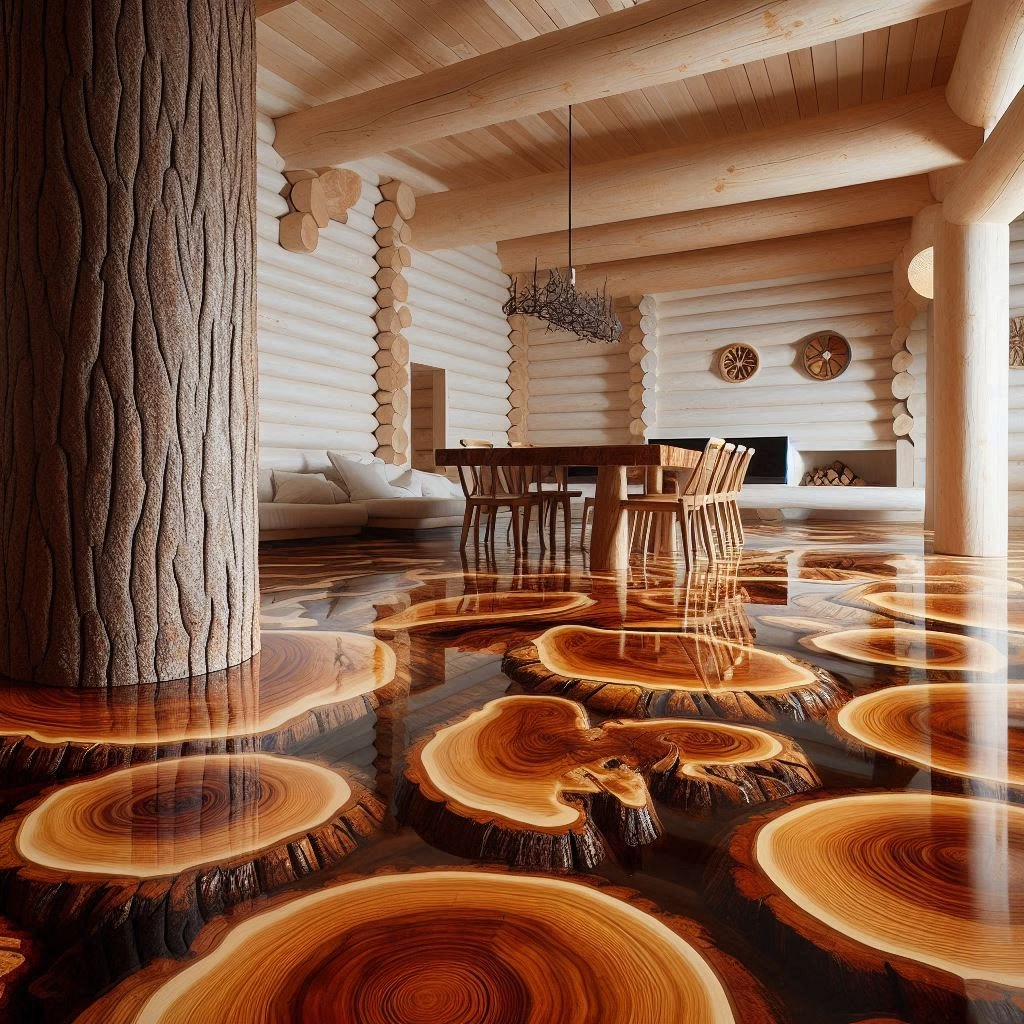
Rustic Cabin Charm
Log floors pair beautifully with exposed beams, stone fireplaces, and rustic furniture. Opt for a distressed finish to enhance the cozy, lived-in look.
Modern Minimalism
Combine log flooring with sleek, modern furniture for a contrasting aesthetic. Light-toned log floors are ideal for brightening up minimalist interiors.
Classic Country Style
Medium-toned log floors with visible knots and grain patterns complement traditional country decor. Add a large area rug for a homely touch.
Installation Process
Step 1: Preparing the Subfloor
Ensure the subfloor is clean, level, and dry. This step is crucial for a seamless installation.
Step 2: Acclimating the Logs
Let the log flooring acclimate to your home’s environment for at least 72 hours to prevent warping.
Step 3: Laying the Flooring
Install the planks using nails, glue, or a click-and-lock system, depending on the type of log floor.
Step 4: Sanding and Finishing
If you’re installing unfinished log flooring, sand and apply your preferred finish to protect the wood and enhance its appearance.
Maintenance Tips for Log Floors
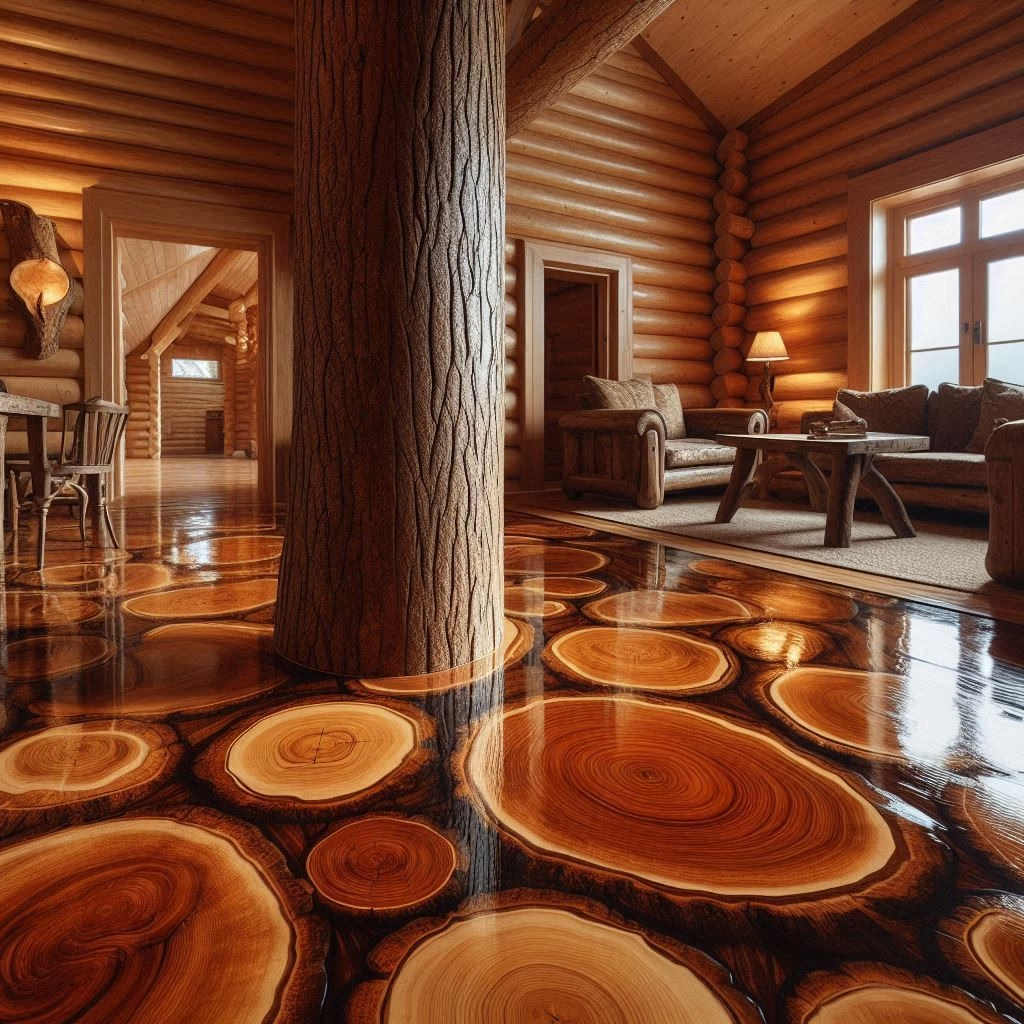
Regular Cleaning
- Sweep or vacuum daily to prevent dirt and debris from scratching the surface.
- Use a damp mop with a wood-friendly cleaner for deeper cleaning.
Preventing Damage
- Place mats at entrances to reduce dirt and moisture.
- Use furniture pads to avoid scratches.
Seasonal Care
Wood expands and contracts with temperature and humidity changes. Use a humidifier during dry winters and a dehumidifier during humid summers to maintain a stable environment.
Cost of Log Flooring
Factors Influencing Cost
- Material: Solid wood is pricier than engineered wood.
- Installation: Professional installation adds to the cost.
- Finishes: Custom finishes may increase expenses.
Average Price Range
Expect to pay between $5 and $20 per square foot, depending on the type and quality of log flooring.
Pros and Cons of Log Floors
Pros
- Timeless aesthetic
- Excellent durability
- Eco-friendly option
Cons
- Prone to scratches and dents
- Requires regular maintenance
- Costlier than other flooring options
How to Choose the Right Log Floor for Your Home
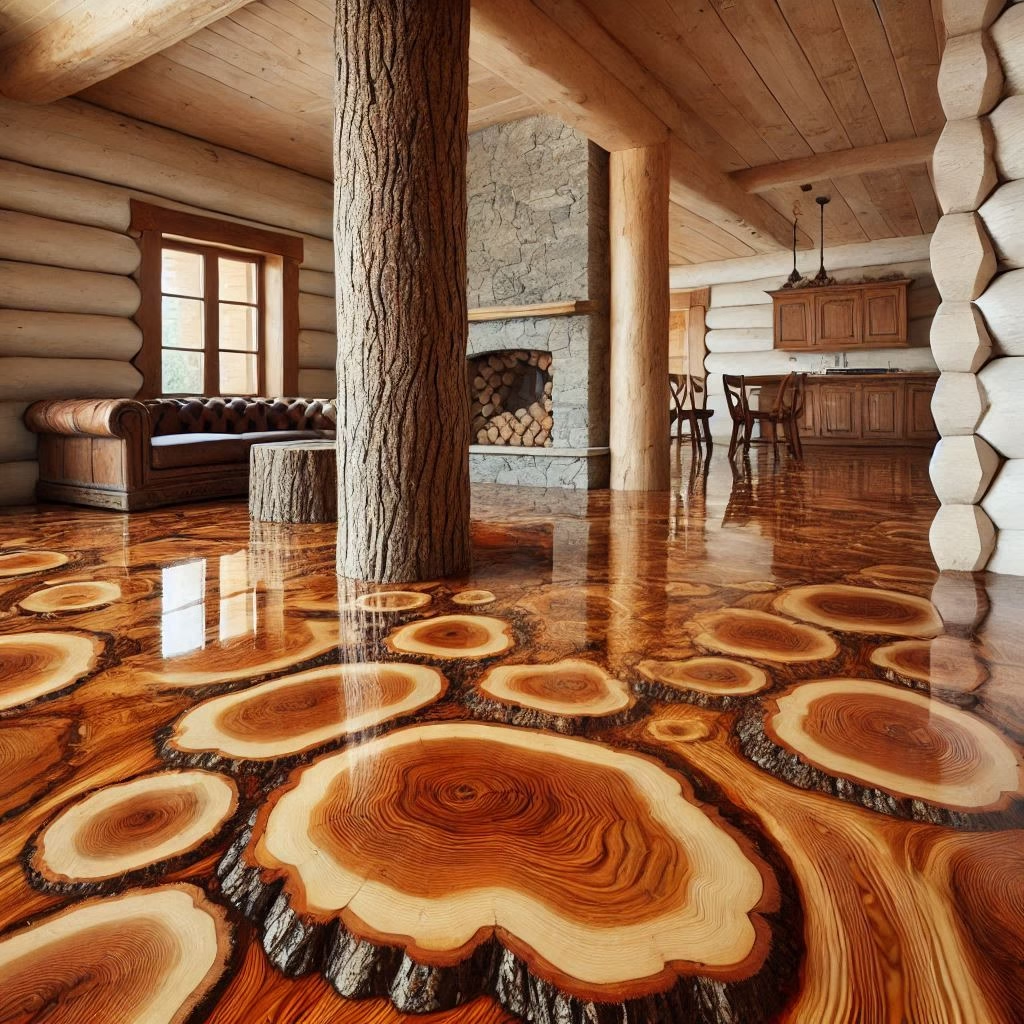
Consider Your Home’s Style
Choose a log floor that complements your interior design. Lighter tones suit modern spaces, while darker finishes enhance traditional or rustic interiors.
Assess Your Budget
Determine how much you’re willing to spend on materials, installation, and maintenance.
Evaluate Durability Needs
If you have a high-traffic home or pets, consider more durable options like engineered log floors with a tough finish.
Sustainable Log Flooring Options
Reclaimed Wood
Using reclaimed wood for log floors is an eco-friendly choice that adds character to your home. These floors often feature unique patinas and imperfections that tell a story.
FSC-Certified Wood
The Forest Stewardship Council (FSC) certification ensures that your wood flooring comes from responsibly managed forests.
DIY vs. Professional Installation
DIY Installation
If you’re handy with tools and have some experience, installing log flooring can be a rewarding project. However, it requires precise measurements and techniques.
Professional Installation
Hiring professionals ensures a flawless finish and saves time. It’s particularly advisable for large spaces or complex layouts.
Enhancing Your Space with Log Floors
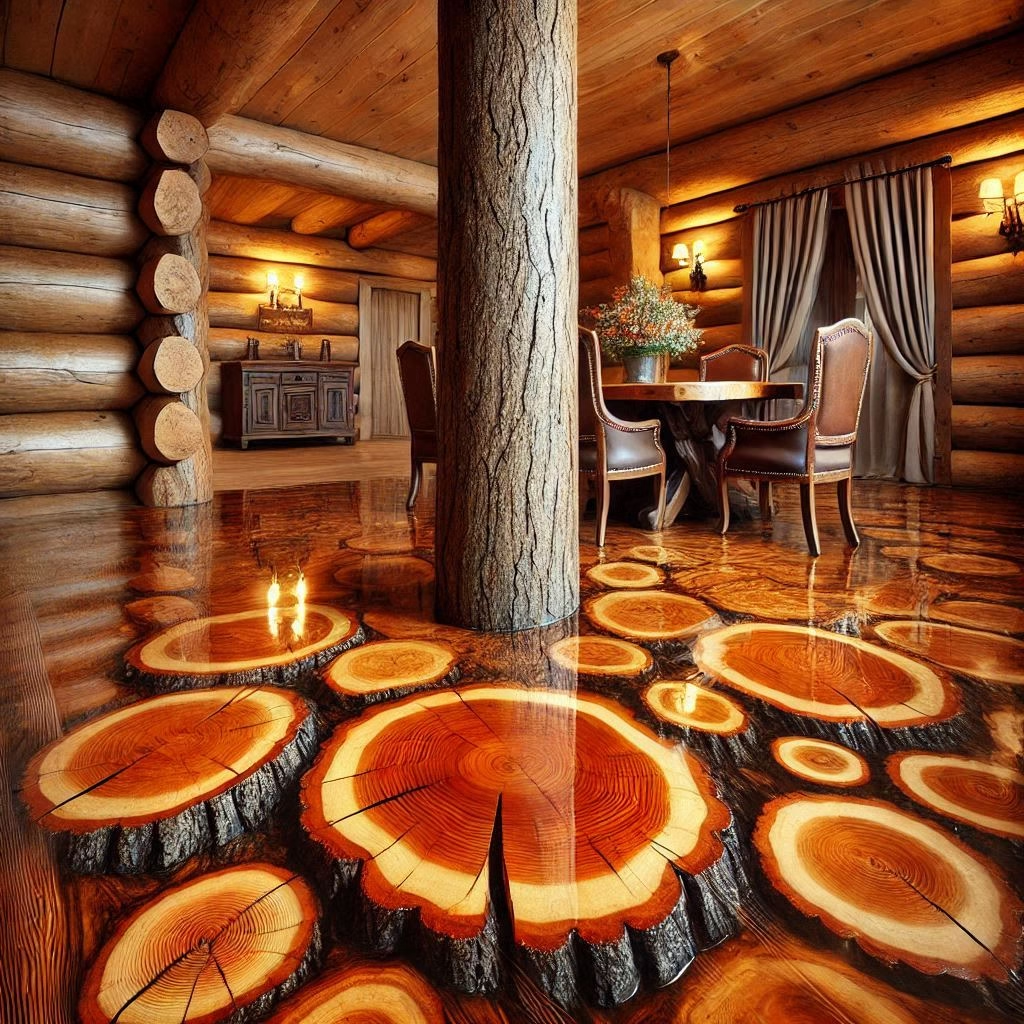
Pairing with Wall Finishes
Combine log floors with shiplap walls or natural stone accents for a cohesive look.
Decorating Tips
- Use neutral-toned furniture to let the log floor shine.
- Add soft textiles like rugs and cushions to create a cozy atmosphere.
Innovative Log Floor Patterns and Layouts
One way to elevate the aesthetic appeal of your log floors is by experimenting with patterns and layouts. While traditional straight planks are timeless, creative arrangements can transform the feel of your space.
Herringbone and Chevron Patterns
- Herringbone: This zigzag pattern involves laying planks in a staggered formation, creating a dynamic and eye-catching look.
- Chevron: Similar to herringbone, but with the ends of the planks cut at an angle for a continuous “V” shape.
Both patterns are ideal for modern or transitional homes, offering a stylish twist to the rustic log floor concept.
Diagonal Installation
Laying your log floors diagonally across the room adds a sense of depth and makes smaller spaces appear larger. This design choice works particularly well in open-concept homes.
Random Width Planks
Mixing planks of varying widths creates a rustic, old-world charm reminiscent of historical log cabins. This approach highlights the natural variations in the wood.
Custom Finishes for Log Floors
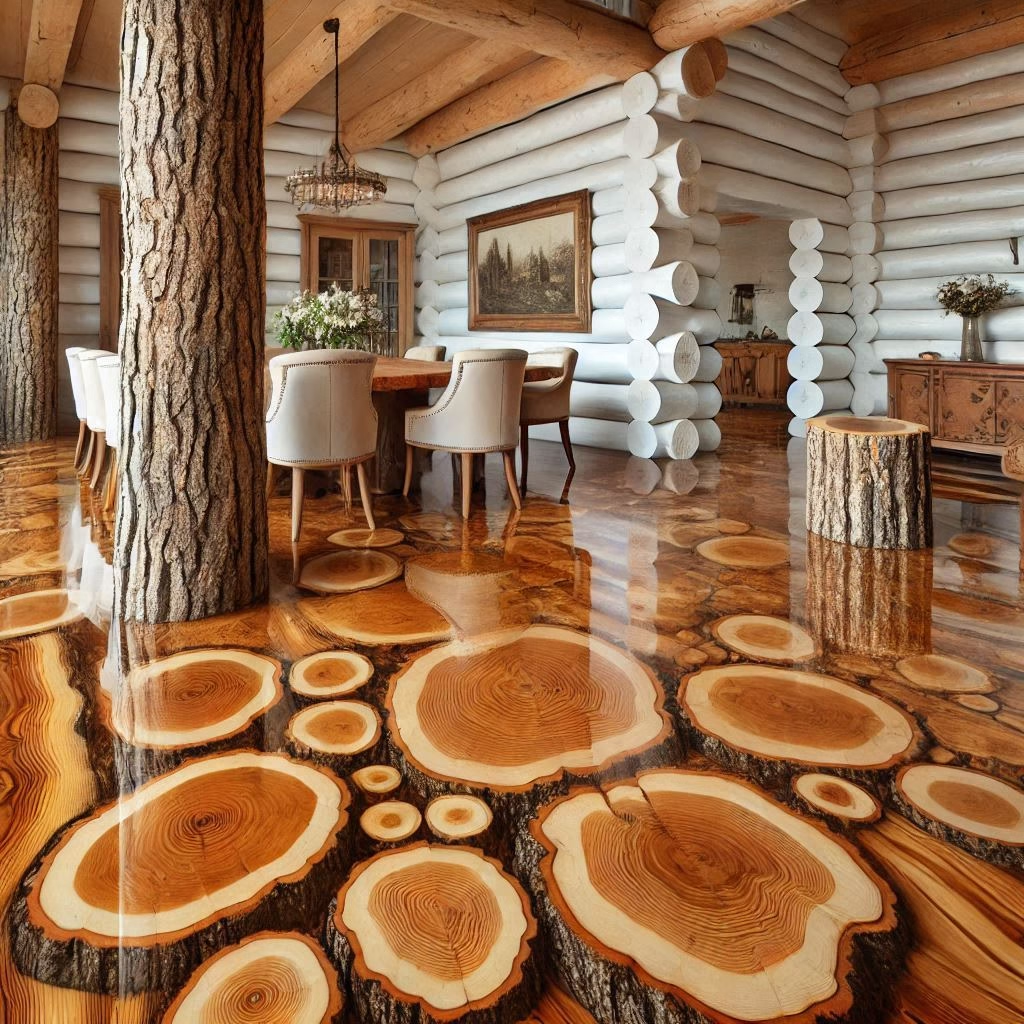
Natural Oil Finishes
Oil finishes penetrate deep into the wood, enhancing its natural beauty and grain patterns. They provide a matte finish that’s perfect for rustic and traditional designs.
Glossy Polyurethane
For a modern or luxurious look, opt for a high-gloss polyurethane finish. It not only adds shine but also offers excellent protection against wear and tear.
Distressed and Hand-Scraped Finishes
These finishes give the wood an aged, weathered appearance, ideal for farmhouse or vintage-inspired interiors.
Whitewashing
A whitewashed log floor softens the natural tones of the wood, giving it a light, airy look. This finish is popular in Scandinavian and coastal design styles.
Log Floor Heating Options
Log floors pair beautifully with radiant heating systems, allowing you to enjoy their warmth—literally. However, it’s important to select the right materials and installation methods to ensure optimal performance.
Compatibility with Radiant Heat
Engineered wood log floors are generally more suitable for radiant heating due to their stability. Solid wood can work, but it may require extra precautions to prevent warping.
Installation Tips
- Ensure the flooring material is rated for use with underfloor heating systems.
- Maintain a consistent temperature to avoid sudden changes that could affect the wood.
Energy Efficiency
Combining radiant heating with log floors creates an energy-efficient solution, as wood retains heat well and distributes it evenly across the surface.
Log Floors for Different Rooms
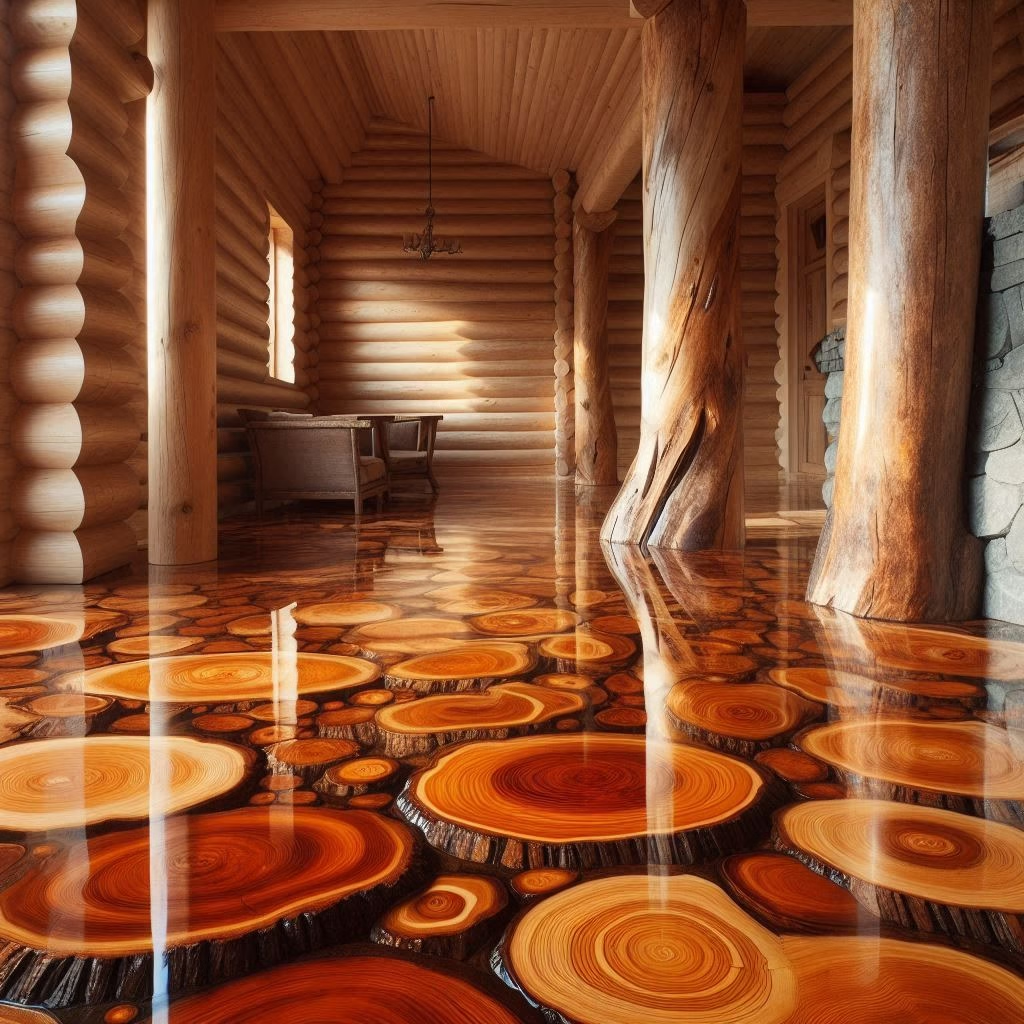
Living Room
As the heart of your home, the living room is an excellent space to showcase the beauty of log floors. Add a plush area rug for added comfort and to define the seating area.
Kitchen
Log floors in the kitchen create a warm and inviting atmosphere. Opt for a durable finish to withstand spills and heavy foot traffic.
Bedroom
Bring a sense of tranquility to your bedroom with log flooring. Pair it with soft textiles and warm lighting for a cozy retreat.
Bathroom
While not the first choice for bathrooms, properly sealed and treated log floors can add a luxurious touch. Engineered wood is a safer bet in high-moisture environments.
Restoring and Refinishing Old Log Floors
If your home already features log floors that have seen better days, restoration can bring them back to life.
Sanding and Refinishing
Over time, scratches, stains, and dullness can detract from the beauty of log floors. Sanding removes surface imperfections, and refinishing restores their original luster.
Repairing Damage
- Minor Scratches: Use a wood filler and matching stain for small blemishes.
- Deep Gouges: Professional repair may be necessary for significant damage.
Rejuvenating the Finish
Reapply a protective finish every few years to maintain the wood’s durability and aesthetic.
Log Floors: Eco-Friendly and Sustainable
In today’s environmentally conscious world, log floors are an excellent choice for those looking to reduce their carbon footprint. Sustainable practices ensure that your flooring choice benefits your home and the planet.
Using Reclaimed Wood
Reclaimed log floors repurpose old wood from barns, factories, and other structures. Not only does this prevent waste, but it also gives your home a unique, storied look.
Carbon Neutral Manufacturing
Many manufacturers now use carbon-neutral processes and renewable energy sources to create log flooring. Researching these brands can ensure your purchase aligns with your eco-values.
Durability Equals Sustainability
The longevity of log floors reduces the need for frequent replacements, making them an environmentally friendly option over time.
Common Myths About Log Floors
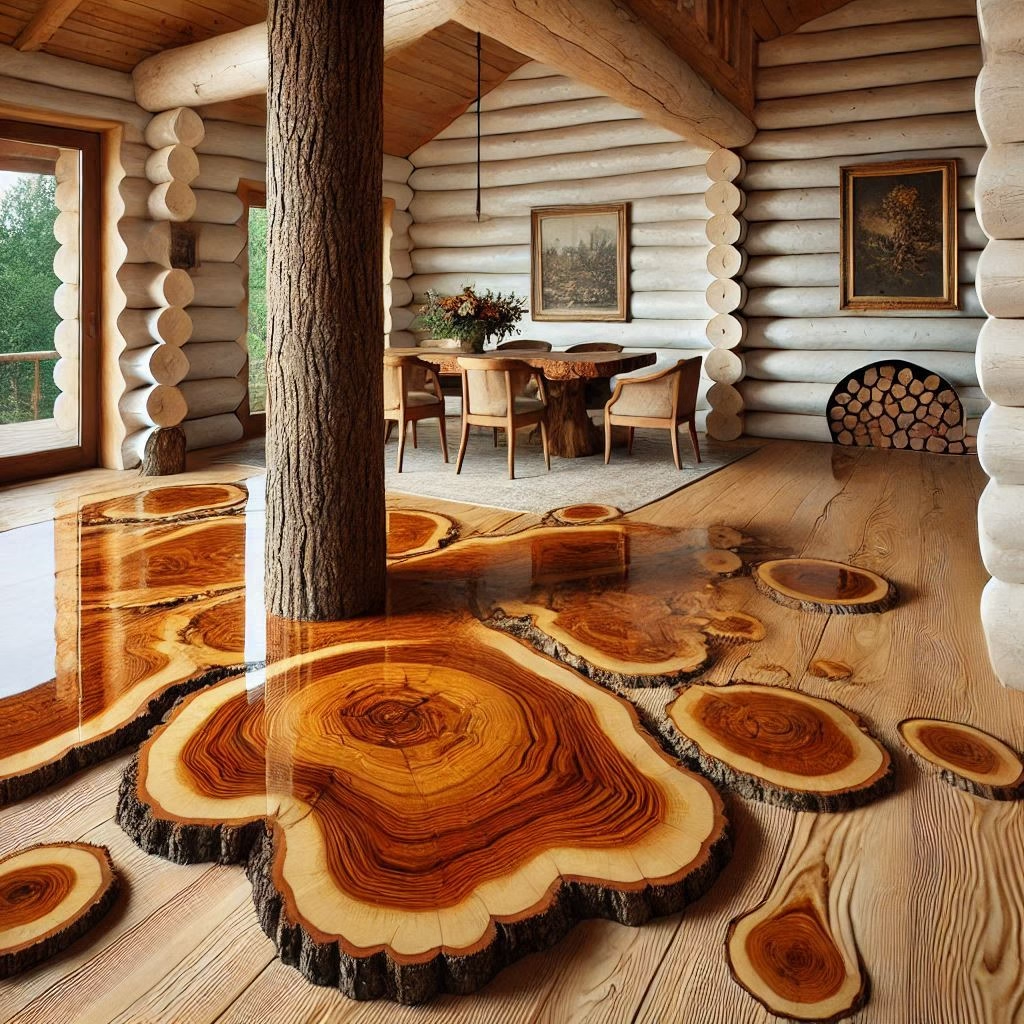
Myth 1: Log Floors Are Hard to Maintain
With proper care and routine cleaning, log floors are no more challenging to maintain than other flooring types.
Myth 2: They’re Only for Rustic Homes
While log floors are a staple in rustic design, their versatility makes them suitable for modern, minimalist, and eclectic styles as well.
Myth 3: Wood Floors Are Noisy
Adding area rugs, felt pads, and proper underlayment can significantly reduce noise associated with wood flooring.
Emerging Trends in Log Flooring
Wide Plank Flooring
Wider planks are gaining popularity for their ability to create a seamless, expansive look. They also highlight the natural grain and character of the wood.
Mixed Materials
Combining log floors with other materials like stone or tiles adds visual interest and defines different areas within open spaces.
Dark and Moody Tones
Dark finishes, such as espresso or walnut, are trending for their dramatic and sophisticated appeal.
Key Considerations Before Investing in Log Floors
- Climate Suitability: Evaluate how your local climate might impact wood expansion and contraction.
- Lifestyle Needs: Homes with kids or pets may require more durable finishes or engineered options.
- Installation Expertise: Decide if you want to DIY or hire professionals based on your budget and skills.
Conclusion: Why Log Floors Are Worth It
Log floors seamlessly blend functionality with timeless beauty, making them a valuable addition to any home. From their natural aesthetic to their versatility in design, they cater to a wide range of preferences and lifestyles. While they require some maintenance and investment, the rewards—lasting durability, eco-friendliness, and undeniable charm—make them worth every penny.
So, whether you’re renovating a rustic cabin or designing a contemporary oasis, log flooring will provide the foundation (quite literally) for a home filled with warmth and character. Explore your options and embrace the enduring allure of log floors!


